An advanced form of radiation therapy is called intensity-modulated radiation therapy, or IMRT. Strong energy beams are used in radiation therapy to destroy cancer cells. Protons, X-rays, and other sources are possible sources of energy.
The radiation beams used in IMRT are meticulously tailored. The beams are fashioned to resemble the cancer's form. While delivering the radiation, the beams can travel in an arc. Each beam's intensity can be changed. A precisely regulated radiation therapy is the end consequence. The right radiation dosage is administered by IMRT as effectively and safely as feasible.
| Country | Cost | Local_currency |
|---|---|---|
| United Kingdom | USD 21500 | 16985 |
| Turkey | USD 5590 - 10000 | 168483 - 301400 |
| Spain | USD 20040 - 23400 | 18437 - 21528 |
| United States | USD 15882 - 23745 | 15882 - 23745 |
| Singapore | USD 25000 | 33500 |
Treatment cost
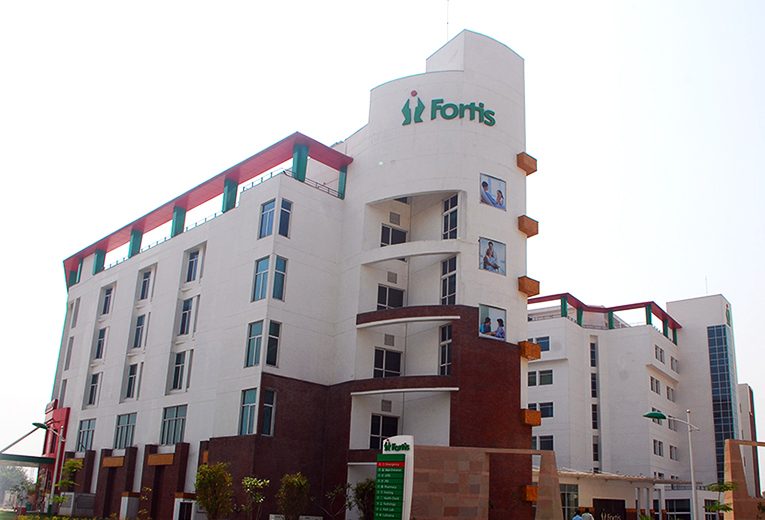
Fortis Hospital, Shalimar Bagh is a super-speciality hospital which occupies a unique place when it comes to providing world class patient care. The hospital is equipped with 262 beds and is expanded over a total area of 7.34 acres. It provides the highest quality of medical care via its team of doctors, technicians, nurses, and management professionals.
Infrastructure & facilities:
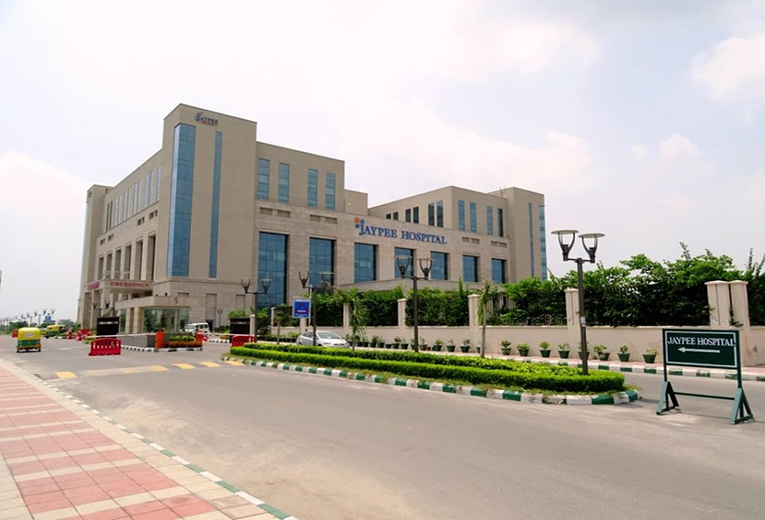
Jaypee Hospital located in Noida, India is accredited by ISO, NABH, NABL. Also listed below are some of the most prominent infrastructural details:
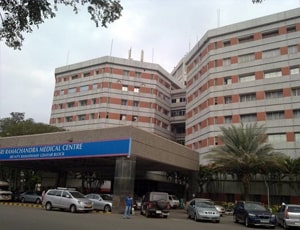
Types of Intensity-modulated radiotherapy (IMRT) in Sri Ramachandra Medical Centre and its associated cost
| Treatment Option | Approximate Cost Range (USD) | Approximate Cost Range (INR) |
|---|---|---|
| IMRT (Overall) | 4545 - 8090 | 372993 - 666601 |
| Head and Neck IMRT | 3537 - 7096 | 292541 - 584893 |
| Breast IMRT | 2341 - 6584 | 191961 - 541419 |
| Prostate IMRT | 3873 - 7105 | 316024 - 583569 |
| Abdominal IMRT | 2538 - 6875 | 208565 - 568336 |
| Pelvic IMRT | 2530 - 6887 | 207090 - 563726 |
| Spine IMRT | 2855 - 8144 | 233163 - 666928 |
| Brain IMRT | 2528 - 6915 | 207924 - 565408 |
| Lung IMRT | 2834 - 8116 | 233510 - 665016 |

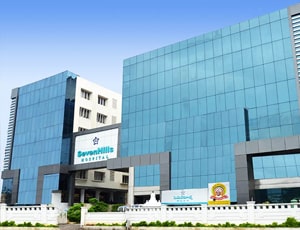
Types of Intensity-modulated radiotherapy (IMRT) in Seven Hills Hospital and its associated cost
| Treatment Option | Approximate Cost Range (USD) | Approximate Cost Range (INR) |
|---|---|---|
| IMRT (Overall) | 5114 - 8881 | 421725 - 724362 |
| Head and Neck IMRT | 4018 - 7793 | 323940 - 655921 |
| Breast IMRT | 2644 - 7233 | 211659 - 607977 |
| Prostate IMRT | 4332 - 8031 | 348110 - 632383 |
| Abdominal IMRT | 2826 - 7810 | 227602 - 627874 |
| Pelvic IMRT | 2790 - 7532 | 232147 - 638003 |
| Spine IMRT | 3088 - 8802 | 263762 - 750418 |
| Brain IMRT | 2841 - 7768 | 232340 - 613705 |
| Lung IMRT | 3134 - 9137 | 263655 - 728308 |
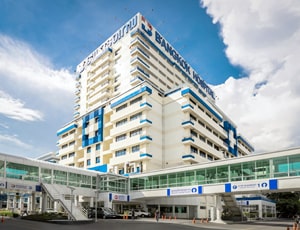
Types of Intensity-modulated radiotherapy (IMRT) in Bangkok Hospital and its associated cost
| Treatment Option | Approximate Cost Range (USD) | Approximate Cost Range (THB) |
|---|---|---|
| IMRT (Overall) | 5703 - 16909 | 198444 - 609378 |
| Head and Neck IMRT | 5495 - 10319 | 188951 - 355804 |
| Breast IMRT | 5142 - 8822 | 183973 - 315821 |
| Prostate IMRT | 5388 - 11307 | 191057 - 403369 |
| Abdominal IMRT | 5114 - 10306 | 179012 - 357461 |
| Pelvic IMRT | 5080 - 10181 | 178117 - 365881 |
| Spine IMRT | 5355 - 11216 | 189985 - 407781 |
| Brain IMRT | 4997 - 7829 | 182813 - 279015 |
| Lung IMRT | 5420 - 11181 | 191513 - 398104 |
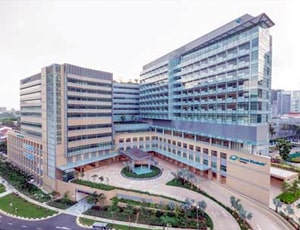
Mount Elizabeth Novena Hospital located in Novena, Singapore is accredited by JCI. Also listed below are some of the most prominent infrastructural details:

Types of Intensity-modulated radiotherapy (IMRT) in Medicana Camlica Hospital and its associated cost
| Treatment Option | Approximate Cost Range (USD) | Approximate Cost Range (TRY) |
|---|---|---|
| IMRT (Overall) | 2038 - 6639 | 61419 - 205773 |
| Head and Neck IMRT | 2046 - 5563 | 62372 - 172428 |
| Breast IMRT | 1699 - 5116 | 51586 - 151651 |
| Prostate IMRT | 2209 - 5526 | 67140 - 170861 |
| Abdominal IMRT | 2032 - 4973 | 59698 - 155074 |
| Pelvic IMRT | 1999 - 5048 | 61157 - 153744 |
| Spine IMRT | 2282 - 5651 | 67788 - 169955 |
| Brain IMRT | 2032 - 5088 | 61360 - 154615 |
| Lung IMRT | 2226 - 6244 | 67763 - 184984 |
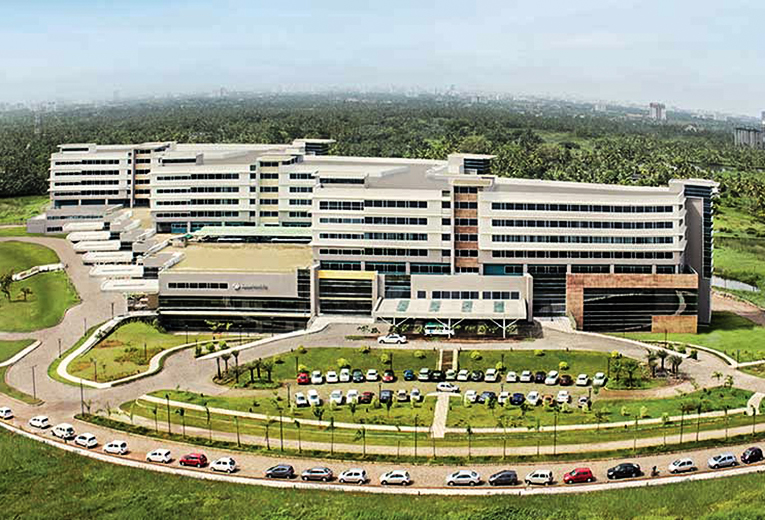
Types of Intensity-modulated radiotherapy (IMRT) in Aster Medcity and its associated cost
| Treatment Option | Approximate Cost Range (USD) | Approximate Cost Range (INR) |
|---|---|---|
| IMRT (Overall) | 4550 - 8094 | 373776 - 667912 |
| Head and Neck IMRT | 3551 - 7126 | 291765 - 583772 |
| Breast IMRT | 2341 - 6626 | 190493 - 541618 |
| Prostate IMRT | 3867 - 7112 | 316654 - 584075 |
| Abdominal IMRT | 2540 - 6913 | 207540 - 564508 |
| Pelvic IMRT | 2530 - 6904 | 208476 - 564951 |
| Spine IMRT | 2841 - 8105 | 233378 - 668551 |
| Brain IMRT | 2530 - 6881 | 208312 - 567550 |
| Lung IMRT | 2840 - 8097 | 231984 - 666482 |
Types of Intensity-modulated radiotherapy (IMRT) in Pushpawati Singhania Research Institute and its associated cost
| Treatment Option | Approximate Cost Range (USD) | Approximate Cost Range (INR) |
|---|---|---|
| IMRT (Overall) | 4560 - 8129 | 374641 - 663934 |
| Head and Neck IMRT | 3551 - 7080 | 290912 - 580416 |
| Breast IMRT | 2344 - 6620 | 191112 - 543355 |
| Prostate IMRT | 3852 - 7098 | 315810 - 584592 |
| Abdominal IMRT | 2536 - 6926 | 208522 - 567436 |
| Pelvic IMRT | 2531 - 6898 | 207540 - 566368 |
| Spine IMRT | 2830 - 8088 | 233967 - 663507 |
| Brain IMRT | 2542 - 6905 | 207376 - 567842 |
| Lung IMRT | 2838 - 8081 | 234157 - 668000 |
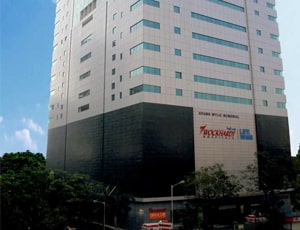
Types of Intensity-modulated radiotherapy (IMRT) in Wockhardt Hospital - A New Age Hospital and its associated cost
| Treatment Option | Approximate Cost Range (USD) | Approximate Cost Range (INR) |
|---|---|---|
| IMRT (Overall) | 4557 - 8085 | 374652 - 667978 |
| Head and Neck IMRT | 3557 - 7139 | 292289 - 580529 |
| Breast IMRT | 2326 - 6599 | 192144 - 538699 |
| Prostate IMRT | 3868 - 7085 | 316475 - 580709 |
| Abdominal IMRT | 2535 - 6886 | 207612 - 564670 |
| Pelvic IMRT | 2530 - 6915 | 207373 - 568081 |
| Spine IMRT | 2832 - 8150 | 233164 - 662991 |
| Brain IMRT | 2539 - 6934 | 209055 - 565007 |
| Lung IMRT | 2845 - 8101 | 233308 - 666735 |
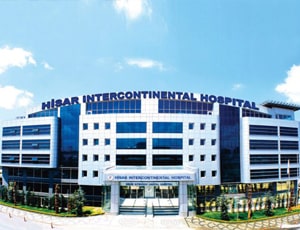
Types of Intensity-modulated radiotherapy (IMRT) in Hisar Intercontinental Hospital and its associated cost
| Treatment Option | Approximate Cost Range (USD) | Approximate Cost Range (TRY) |
|---|---|---|
| IMRT (Overall) | 2019 - 6667 | 60475 - 205854 |
| Head and Neck IMRT | 2039 - 5709 | 61928 - 171760 |
| Breast IMRT | 1686 - 5023 | 50701 - 150740 |
| Prostate IMRT | 2206 - 5591 | 68684 - 166634 |
| Abdominal IMRT | 2054 - 5066 | 59789 - 152721 |
| Pelvic IMRT | 1985 - 5003 | 61164 - 150736 |
| Spine IMRT | 2204 - 5524 | 68943 - 171322 |
| Brain IMRT | 2055 - 5093 | 61210 - 155592 |
| Lung IMRT | 2255 - 6108 | 67415 - 186614 |
DOCTORS IN 12 SPECIALITIES
FACILITIES & AMENITIES

Types of Intensity-modulated radiotherapy (IMRT) in NMC Specialty Hospital and its associated cost
| Treatment Option | Approximate Cost Range (USD) | Approximate Cost Range (AED) |
|---|---|---|
| IMRT (Overall) | 9168 - 39040 | 32568 - 146026 |
| Head and Neck IMRT | 8275 - 13238 | 31620 - 48555 |
| Breast IMRT | 7708 - 12232 | 28868 - 44771 |
| Prostate IMRT | 8510 - 14728 | 30321 - 53075 |
| Abdominal IMRT | 7859 - 12203 | 29112 - 45993 |
| Pelvic IMRT | 8014 - 12470 | 28531 - 45231 |
| Spine IMRT | 8257 - 14866 | 30860 - 54512 |
| Brain IMRT | 8019 - 10242 | 28436 - 37469 |
| Lung IMRT | 8584 - 14869 | 31388 - 52640 |
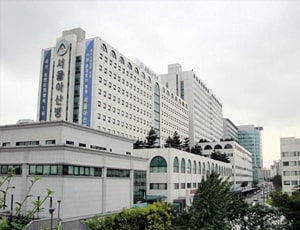
Asan Medical Centre located in Seoul, South Korea is accredited by ISO. Also listed below are some of the most prominent infrastructural details:
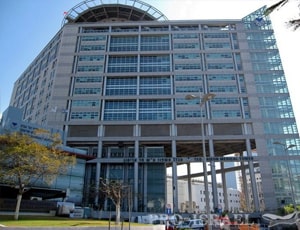
Tel Aviv Sourasky Medical Center -Ichilov Hospital located in Tel-Aviv, Israel is accredited by JCI. Also listed below are some of the most prominent infrastructural details:
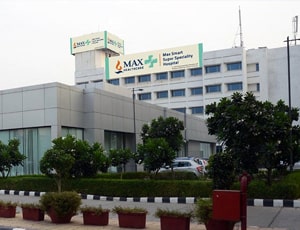
Types of Intensity-modulated radiotherapy (IMRT) in Max Smart Super Speciality Hospital and its associated cost
| Treatment Option | Approximate Cost Range (USD) | Approximate Cost Range (INR) |
|---|---|---|
| IMRT (Overall) | 4550 - 8118 | 375092 - 668365 |
| Head and Neck IMRT | 3549 - 7135 | 290220 - 585268 |
| Breast IMRT | 2337 - 6570 | 192320 - 540801 |
| Prostate IMRT | 3857 - 7122 | 315307 - 584997 |
| Abdominal IMRT | 2544 - 6881 | 208345 - 563660 |
| Pelvic IMRT | 2541 - 6892 | 207831 - 564732 |
| Spine IMRT | 2829 - 8129 | 233628 - 664518 |
| Brain IMRT | 2532 - 6917 | 207791 - 568026 |
| Lung IMRT | 2842 - 8114 | 233815 - 668243 |
Intensity-modulated radiotherapy (IMRT) is a type of conformal radiotherapy, a technology that enables the radiation oncologist to precisely target the tissues with cancer cells. . In this type of radiation therapy for cancer, the radiation beams closely take up the shape of the area that is being targeted.
IMRT is delivered through the standard radiotherapy machine, which is also known as the linear accelerator (LINAC). This machine has a device called multileaf collimator, which possesses lead leaves that can move independently to form a shape that best fits the target area.
Because the radiation beams can take up the shape of the target area, high dosage of radiation can be delivered to kill the cancer cells while minimizing exposure to the non-cancerous cells and tissues. IMRT proves to be highly effective in the case of head and neck cancer among other types of cancer.IMRT for prostate cancer is now available across all major hospitals around the world.
The efficiency of IMRT has already been tested for multiple cancers, including breast cancer. Latest advancements improving the efficacy of radiotherapy, however, continue to take place in the field of healthcare. This radiation treatment for cancer is already being used as a standard treatment for some cancer types.
Typically, the following steps are performed during the IMRT session:
A typical IMRT session lasts for about 15 to 30 minutes.
IMRTradiation therapy for cancer is a painless procedure. The patient does not feel anything during the radiotherapy session. However, there could be some level of discomfort due to posture or the use of masks and moulds. After this radiation treatment for cancer, the patient is made to lie on the table for a few minutes after the treatment to relax.
A few patients may experience increased frequency of urination or a sudden urge to urinate. Patients are advised to drink at least six to eight glasses of water every day to recover quickly from the session. Additionally, they should try to avoid excess consumption of spicy foods, caffeine, and alcohol during the recovery phase.
Recovery Process post-Intensity-modulated radiotherapy (IMRT)
Some patients may feel excessive tiredness and fatigue during the course of radiation treatment. Such patients should plan their daily activities and take several short naps during the day to manage their energy levels. Additionally, they are advised to take high protein and high-calorie foods during and after the treatment.
Patients should use a non-scented soap to clean the area that has been exposed to radiation. Additionally, they should keep their skin moisturized.
Ask your healthcare adviser for the best multiple options and choose the one that meets your expectations